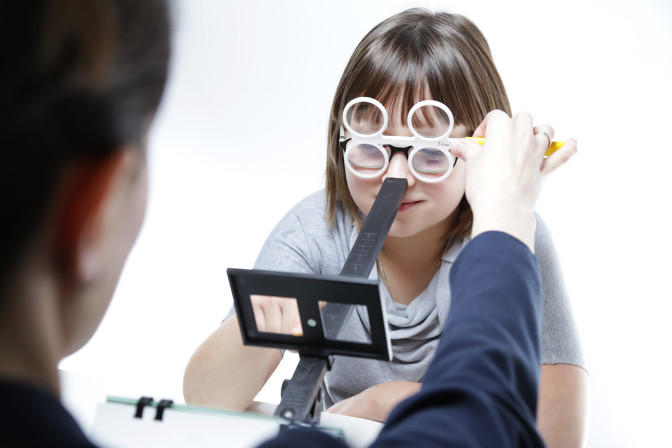Buy One, Get One 50% OFF Eyeglasses
* Restrictions apply. Ask a Team Member for details.
Vision Therapy in Ann Arbor, MI

Vision Therapy from Clarkson Eyecare
Clarkson Eyecare is staffed with highly trained eye doctors to help adults and children improve their vision. Dr. Kristin Dzierwa & Dr. Laura Burger in Ann Arbor, MI and Dr. Andrea Lirones at our Lake Lansing, MI office, take a special interest in vision therapy. Our doctors are board-certified and strive to provide the best care for their patients by continuing to be on the cutting edge of new technology.
Convenient Locations

Find a Clarkson Eyecare Vision Therapy Center Near You
Clarkson Eyecare has an eye doctor in the Ann Arbor, MI area who provides vision therapy services.
What is Vision Therapy?
Vision therapy is conducted by optometrists and aims at improving and strengthening visual skills to help the eyes work more effectively and efficiently. Vision therapy uses a variety of exercises to not necessarily improve your eyesight, but more so to improve visual skills like focusing, eye-tracking, hand-eye coordination, visual processing, convergence, and more. Therapy is structured as a performance enhancement program focusing on children and adults of any age or developmental stage. A vision therapy program typically consists of supervised exercises performed over weeks or months. In addition to exercises, lenses, prisms, filters, patches, computer programs, sensory integration techniques, electronic targets, or balance boards may be used.
Vision Therapy & Convergence Insufficiency
Convergence insufficiency is a common condition that causes trouble focusing on an object close to you. Insufficiency means your eyes are not working as well to focus and comprehend books, phones, tablets, computers, and any time that is close to you. Convergence insufficiency can occur in both children and adults and causes trouble focusing on homework, reading, and computer work. Vision therapy is useful for the treatment of convergence insufficiency and can increase a person's ability to converge the eyes, resulting in more comfortable and efficient vision.

Meet Kristin Dzierwa, O.D.
Dr. Kristin Dzierwa ("Dr. Kristin") is happy to return to her roots in Michigan to practice pediatric and primary care optometry. She is an alumna of the Illinois College of Optometry and the University of Michigan. She is a member of the American Optometric Association, Michigan Optometric Association, the College of Optometrists in Vision Development, and she participates in INFANTSEE providing free eye exams to infants. Dr. Kristin Dzierwa has done research regarding convergence insufficiency and was awarded the COVD award for excellence in vision therapy in 2019. In her free time, she enjoys travel, home improvement projects, and time spent with her husband and two enormous dogs.

Meet Laura Burger, O.D.
Dr. Laura Burger was born and raised in Ann Arbor, Michigan. She graduated from Indiana University School of Optometry in 2017. Dr. Burger's areas of specialty include pediatrics, binocular vision disorders, contact lenses and ocular disease. Dr. Burger is a member of the College of Optometrists in Vision Development, the American Optometric Association and the Michigan Optometric Association. In her free time, she enjoys traveling, hiking and spending time with family and friends.
Frequently Asked Questions About Vision Therapy
Optometric vision therapy can be very beneficial for children who have learning difficulty, poor reading skills, trouble with hand-eye coordination, a lazy eye, and more. Some learning difficulties may stem from vision problems like convergence insufficiency which can cause poor focusing ability on an object close to them, like a book or tablet.
Just like any therapy, it is a weekly in-office treatment program with additional at-home therapy. Every person is different, and the amount of time therapy is needed differs. Improvements and results can be noticed in just a few weeks or up to a few months.
Vision therapy is beneficial for both adults and children who might have trouble focusing, poor hand-eye coordination, and other vision issues such as:
Problems with reading
Focusing problems (accommodative issues)
Crossed Eye/Eye Turn (Strabismus) or Lazy Eye (Amblyopia)
Binocular vision issues (problems with the eyes working together or teaming)
Convergence Insufficiency (eye alignment issue up close)
Traumatic Brain Injury including Concussions
Computer-induced or Stress-induced vision problems
Visual Perception Disorders
Visual-Motor Disorders
Vision therapy consists of various exercises that help improve the connection and communication between your brain and your eyes. A vision therapy program consists of supervised exercises performed over weeks to months. In addition to exercises, lenses, prisms, filters, patches, computer programs, sensory integration techniques, electronic targets, or balance boards may be used. Vision therapy helps improve your eyes’ efficiency and your performance in life activities including school work, sports, driving, balance, and more.